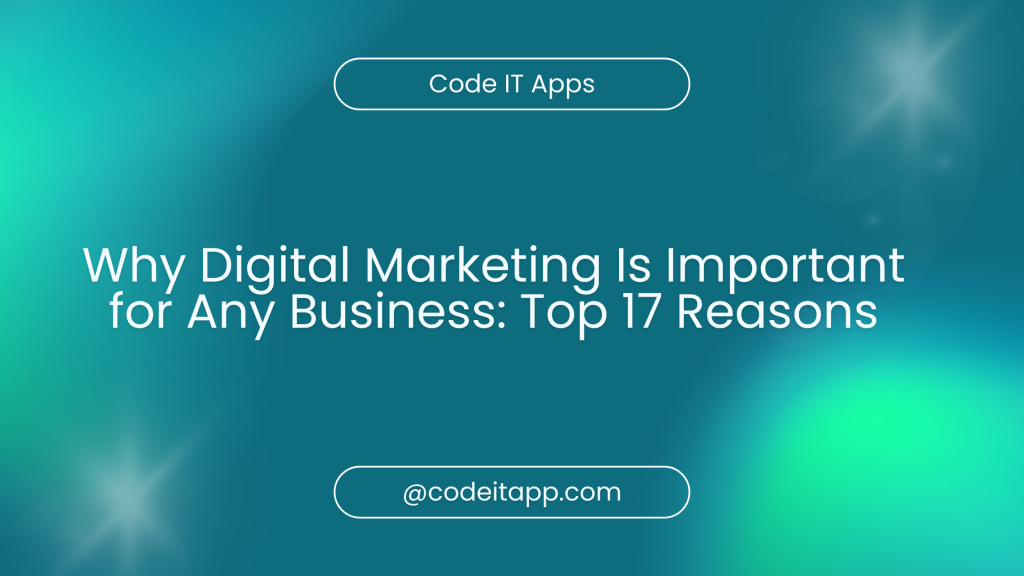
Introduction to Digital Marketing
Digital marketing uses online tools and channels—like social media, email, search engines, mobile apps, and websites—to promote a business. Unlike traditional advertising, it lets companies interact in real time, monitor performance, and improve results over time.
Originally, businesses leaned on TV, radio, and print ads. However, as people started spending more time online, marketers shifted towards digital. Today, nearly everyone starts their purchasing journey with a quick online search.
The Role of Online Presence in Modern Business
Shifting Consumer Behavior
Nowadays, people check Google reviews, browse social media, and ask friends before buying. Therefore, if your business isn’t online, you’re missing out on customers who begin their search on the web.
Digital First Impressions
Moreover, a well-designed website or social profile builds trust. In contrast, a neglected online presence can push customers away.
Cost-Effectiveness and ROI
Comparing Costs
While TV and print ads can be costly and hard to track, digital options—like PPC and email campaigns—are budget-friendly. Even small businesses can start with low-cost ads and still achieve good results.
Measuring Return
Plus, tools like Google Analytics show exactly what’s working. As a result, marketers can refine ads, improve campaigns, and maximize returns.
Targeted Audience Reach
Precision Targeting
You can focus your ads on specific groups based on age, location, and interests. This way, you avoid wasted spending and reach people most likely to buy.
Behavior-Based Marketing
Furthermore, tools like retargeting allow you to reach people who’ve visited your site. Consequently, you can tailor messages based on their interests.
Data-Driven Decisions
Analytics and Insights
Every click and view can be tracked. Therefore, you get insights that guide better decisions and stronger campaigns.
A/B Testing
By testing different versions of ads and pages, marketers discover which ones perform best. Because of this, they can optimize campaigns continually.
Enhanced Customer Engagement
Real-Time Interaction
Digital platforms enable immediate feedback through comments, chat, and surveys. As a result, businesses can build stronger relationships.
Seamless Communication
Moreover, messages can be sent through various channels—email, social media, or apps—providing a smooth experience.
Brand Awareness and Credibility
Social Proof
Positive reviews and shared content build a trustworthy online image. Because of this, consumers feel more confident choosing your brand.
Consistent Messaging
Consistent messaging across the web reinforces your brand identity and helps customers remember you.
SEO and Online Visibility
Organic Search Traffic
SEO helps your site appear high in search results. Consequently, more people find and trust your site without paying for ads.
Local Business Reach
For local businesses, optimizing for “near me” searches is essential. As a result, nearby customers can easily find you on mobile.
Social Media Influence
Viral Potential
A single video or post can go viral and reach thousands—or even millions—without spending a cent.
Building Community
Moreover, social media platforms let businesses create community around their brand, which leads to loyal followers.
Email Marketing and Retargeting
Keeping Customers
Email allows you to stay in touch with customers. In addition, you can remind them about offers or new products.
Personalized Campaigns
Furthermore, segmenting your email list allows you to send personalized content. As a result, engagement and sales typically rise.
Mobile Marketing for On-the-Go Users
Direct Reach
Through mobile apps and SMS, businesses can send timely messages right into customers’ pockets.
Mobile-Friendly Design
Since most people browse on their phones, it’s vital your website and ads work well on small screens.
E-Commerce and Digital Sales Funnels
Customer Journey
Digital marketing guides people from discovery to purchase, with tools like ads, email, and landing pages.
Cart Abandonment Recovery
Plus, you can re-engage shoppers who forgot items in their cart, turning potential losses into sales.
Automation and Efficiency
Smart Tools
Software such as Mailchimp and HubSpot streamlines tasks like emails and follow-ups. Therefore, your team can focus on big-picture strategy.
Better Workflows
Automated workflows ensure your campaigns run smoothly and efficiently, reducing mistakes.
Competitive Edge and Industry Trends
Staying Ahead
Digital marketing lets you react quickly to industry changes. In addition, you can spot trends early before competitors do.
Adapting Fast
Because digital tools provide immediate data, you can adjust campaigns promptly to improve results.
Scalability and Flexibility
Grow at Your Pace
You can begin with a small budget and scale up based on what works. As a result, growth is built on solid data and proven results.
Testing Before Scaling
Moreover, you can trial new ideas with minimal risk. Because of this, you invest more wisely in what works best.
Common Misconceptions About Digital Marketing
Myth vs Reality
Some think digital marketing is only for big companies. On the contrary, it’s accessible to businesses of all sizes with any budget.
Realistic Goals
Clearly, digital marketing isn’t a quick fix. However, with patience and smart planning, it delivers steady, measurable growth.
Conclusion: Embracing Digital Marketing for Business Growth
All in all, digital marketing isn’t optional—it’s essential. With its precise targeting, measurable results, and cost-efficiency, it offers unmatched value. By using digital tools wisely, businesses can reach more people, build brands, and achieve lasting growth.
Frequently Asked Questions (FAQs)
1. Why is digital marketing better than traditional marketing?
Because it’s cost-effective, trackable, and customizable. Plus, real-time engagement delivers better results.
2. Can small businesses benefit from digital marketing?
Yes! Targeted ads and smart tools help small businesses compete effectively.
3. How long before I see results?
PPC and social ads can show results fast. SEO takes a few months, but the impact lasts longer.
4. Is digital marketing good for all industries?
Absolutely! Any business—from local shops to global brands—can benefit from digital tools.
5. What’s the most effective strategy?
A balanced mix—SEO for visibility, content for trust, social for engagement, and email for retention.
6. Should I hire an agency or DIY?
You can start on your own. However, agencies bring experience and tools that help accelerate success.
if you want to hire me, please contact me